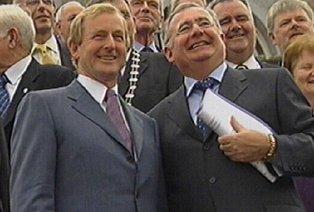TDs show little interest in Moriarty - but rush to censure

Politicians showed a lack of knowledge, or even interest, in the lengthy but explosive Moriarty report, writes Vincent Browne
The two main speakers on the government side in the Dáil, Enda Kenny and Pat Rabbitte, said nothing at all of consequence, supposedly inhibited in what they could say lest they prejudice further investigations and possibly criminal prosecutions. There was a reasonable turnout of backbench government TDs present when Enda Kenny was speaking. Immediately afterwards most of them left the chamber.
There were quite a few from the depleted ranks of Fianna Fail present while Micheál Martin spoke – it was one of the best speeches of the debate – and when Micheál was finished they then filed out, or most of them did. When Michael Lowry, the main character in that drama, delivered his response to the Tribunal's findings against him, there were about one third of the Dáil's 166 TDs present. The other two thirds couldn't be bothered, to hear the speech of the person on whom they were to vote censure two days later.
Mick Wallace, the blond from Wexford, spoke briefly, incidentally without inferring that he had even seen the Moriarty Tribunal report, but what he said was interesting: "I am disappointed the Chamber is not full. The Moriarty tribunal and its report have serious implications for our society. Does it not matter enough? If they are serious about making this Parliament work in the manner it should or organising our society properly, can they show a bit more interest? Can they be here? We have a huge responsibility. The people put us here. They expect us to run this country in an honest fashion, to make honest decisions and to care. We have to forgive them for thinking we do not care."
It was obvious that not a single person who contributed to the debate either on Tuesday or Wednesday had read the Moriarty report and it was obvious that several of those who contributed had not read a line of it. That none of them had read the report in full was not surprising for it is over 2,400 pages long, but why have a debate on a report at a time when nobody could have read through it? Why wasn't the debate scheduled for a month later, by which time maybe four or five people might have read the thing?
What was astounding however was that every one of them, aside from Michael Lowry himself, assented on Thursday morning to this motion: "That Dáil Éireann: notes the Final Report of the Moriarty tribunal; believes that the conduct of Deputy Michael Lowry set out in the tribunal's report was completely unacceptable for a member of the House; and calls on Deputy Lowry to voluntarily resign his membership of Dáil Éireann."
How could they possibly believe "the conduct of Deputy Michael Lowry set out in the tribunal's report was completely unacceptable" when they had not read the report? And how outrageous it was to besmirch the reputation of a colleague in Dáil Éireann by passing a motion of censure without even a cursory examination of the basis for censure.
I am not saying Michael Lowry does not deserve censure. I do not know, for I have got through only about a sixth of the report and so far I am not convinced that he did anything at all that materially assisted Esat Digifone to get the second mobile phone licence – the evidence that money changed hands through the most circuitous of routes is more convincing, but I withhold judgement on that also until I finish reading the report (ask me again in 2012!). What I am saying is that it represents the worst example of the old stunt politics that virtually every TD in the Dáil should pass a vote of censure on another TD on the basis of a report they knew little about and that most of the TDs who voted censure couldn't even bother being in the chamber when the censured TD offered a defence to the report's allegations concerning him.
They are a bloody disgrace. Every one of them!
And as to the reticence of Enda Kenny and Pat Rabbitte because of a concern lest they prejudice future investigations and possible prosecutions, who advised them of that? I cannot believe that any reputable lawyer, not suffering from a severe anal affliction, advised either of them that a comment made on a report could possibly prejudice a future prosecution months (maybe years) before such prosecution arose? If that were so, nobody could say anything about the causes of the banking crisis, the apparent criminality in the fixing of share prices of publicly quoted companies, about fraudulent accounting, and so much more. It is just nonsense.
If they had withheld comment because they had not had an opportunity to read the report – and certainly Enda Kenny has better things to do with his time than spending a few weeks reading this – that would be fine, but they should say that.
